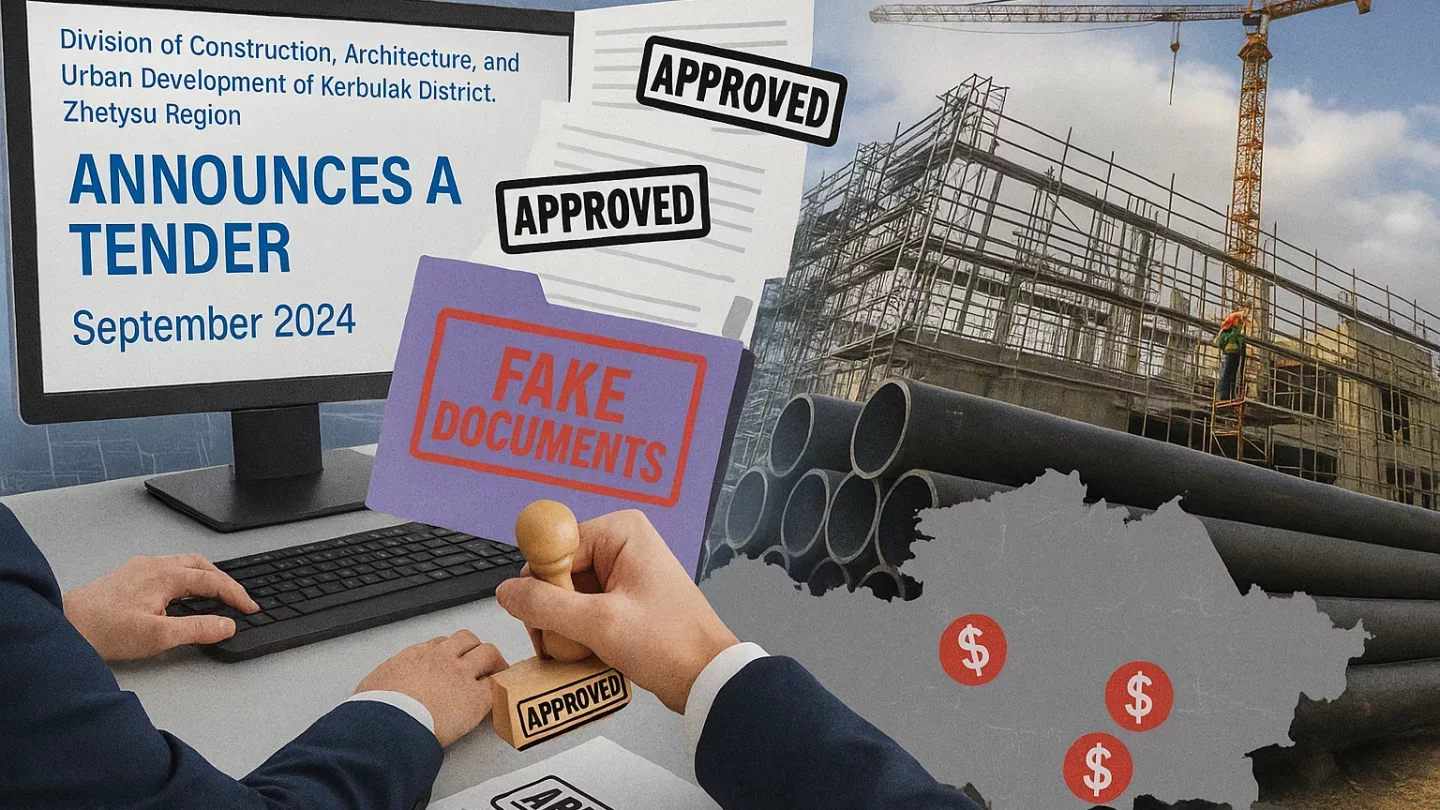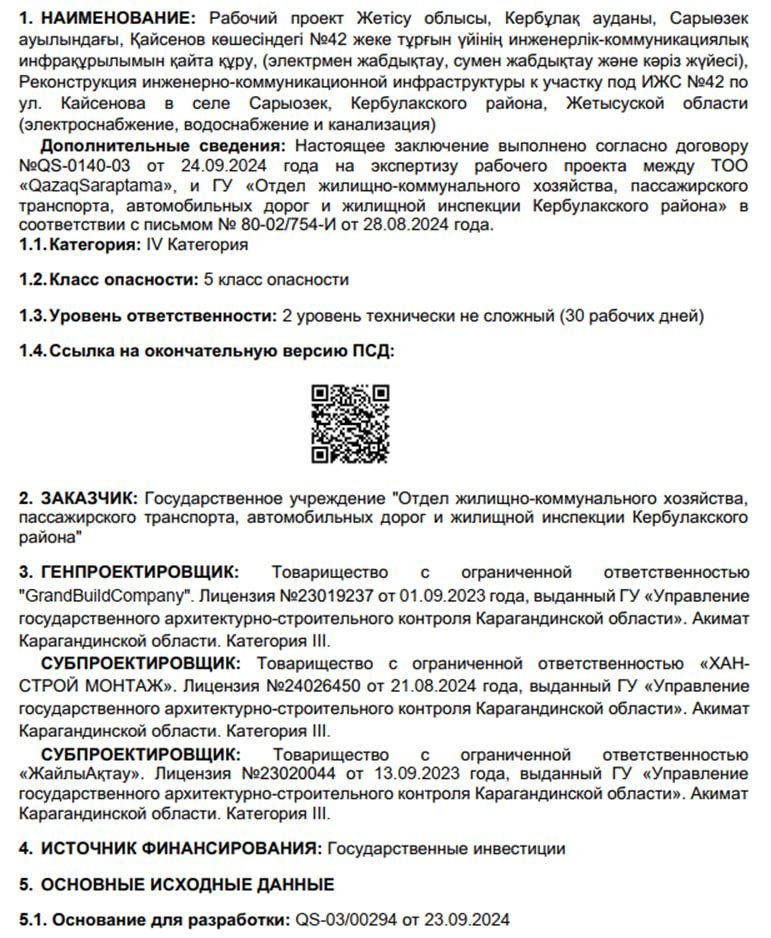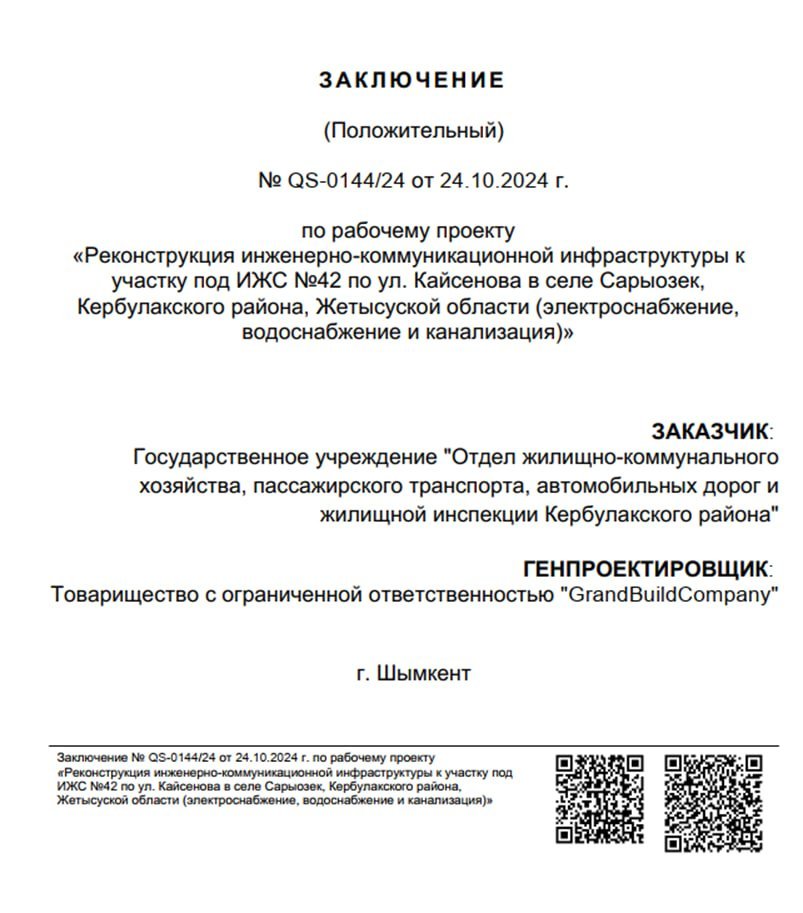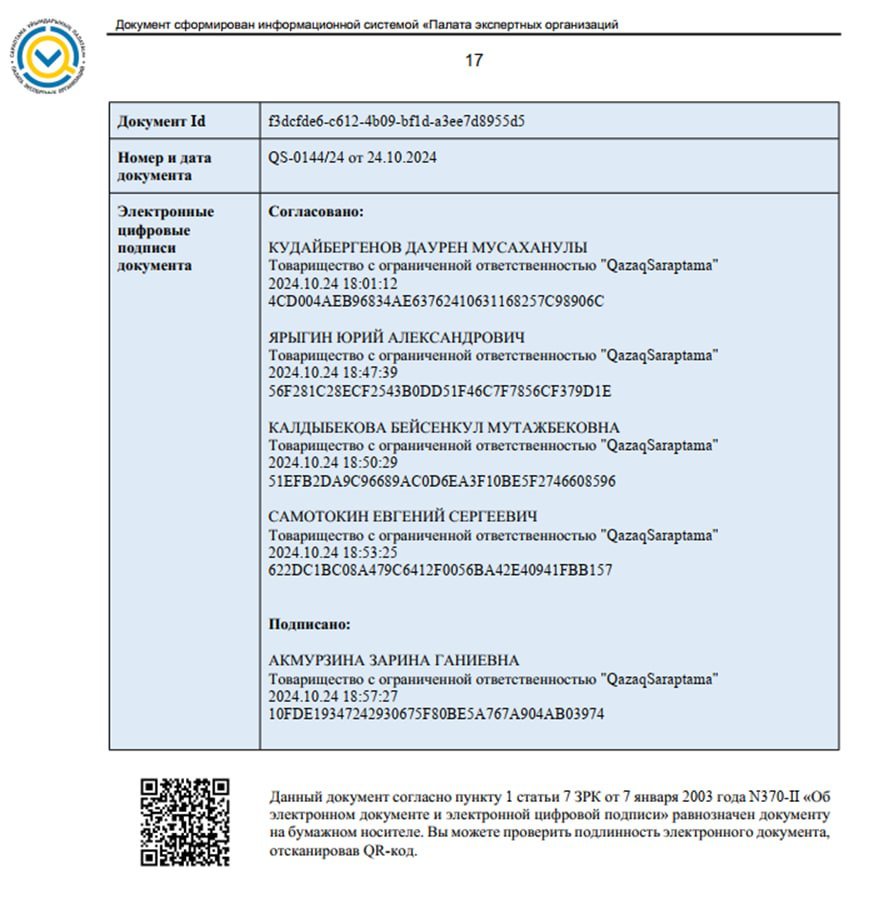"The Kerbulak Experience": How Dozens of Firms with Fake Documents Won Tenders Worth Billions
 Photo: Midjorney, ill. purposes
Photo: Midjorney, ill. purposes
In the summer of 2024, amid talk of tighter tender regulations—specifically, a rule requiring proof of actual experience in public procurement — a group of former civil servants from the South Kazakhstan region came up with a new way to fake that experience.
Orda.kz continues its investigation into schemes used to illegally secure state contracts.
A Twist on an Old Scam
We previously reported on an older version of the scheme, which exploited the Contractor Rating-Point System (RPS).
The method:
- Invent a construction project
- Print fake completion certificates
- Register all documents on the public procurement portal
- Secure confirmation of “work experience” through personal contacts in the State Architectural and Construction Control and the local Akimat
- Use the fabricated experience to qualify for and win tenders
The scheme has since evolved. This time, those involved aren't entering the competition manually — they're doing it through the official web portal, complete with a state seal.
How It All Started
In September 2024, the Department of Construction, Architecture, and Urban Development of Kerbulak District in the Jetisu Region announced a tender for “current repairs of rental houses” under the label of “seismic reinforcement.”
Strangely, the tender slipped past both the Department of Internal State Audit and the Prosecutor’s Office—institutions that routinely inspect and even cancel questionable procurements. The tender concluded with the purchase of 50 separate lots for “reinforcement of metal structures.”
This paved the way for an unprecedented scheme that allowed dozens of companies to obtain fake credentials and qualify for future tenders, facilitated by a wide network of public officials.
Yet, oversight bodies that are typically swift to respond appeared to have done nothing.
Each of the 50 lots described work that boiled down to laying just five meters of pipe. All 50 lots were then evenly split between two contractors, 25 each.
All related documents are publicly accessible for verification, but here’s how the scheme played out step-by-step:
On August 28, 2024, the Department of Housing and Public Utilities, Passenger Transport, Highways, and Housing Inspection of Kerbulak District sent a request to the Shymkent-based expert organization QazaqSaraptama LLP to conduct a review of project documentation related to the reconstruction of engineering and communications infrastructure.
The design work was carried out by GrandBuildCompany LLP, which included so-called subcontractors in the documents—firms that had received their licenses just one day earlier, on August 21, 2024.

On September 4, 2024, a tender was announced — not for reconstruction, but for the current repair of metal fences. The results were finalized by October 17.
On September 24, the Akimat of Kerbulak District formally signed an agreement with QazaqSaraptama to carry out the project assessments.

On October 24, QazaqSaraptama issued dozens of positive expert reviews for working projects labeled as “Reconstruction of engineering and communications infrastructure for individual housing construction,” covering utilities such as electricity, water supply, and sewerage.
Industry experts reviewing the documents say the paperwork is so poorly compiled that it should never have passed through any legitimate authority.
QazaqSaraptama LLP, in violation of construction regulations, assigned a ‘second-level, technically uncomplicated’ classification to project documents in dozens of expert conclusions. But individual housing construction is always classified as third-level — the lowest — and experience in that category cannot be used to qualify for public tenders. The Chamber of Expert Organizations approved all expert conclusions and issued QR codes for each one. Positive conclusions from the state expert review were obtained for the developed design and estimate documentation — meaning half of the required paperwork for public procurement was already secured, construction worker Nurzhan Shakenov told us.
The regional State Architectural and Construction Control Department eventually stepped in.
On November 19, 2024, the Department of State Architectural and Construction Control of the Jetisu Region began issuing dozens of construction permits for the same engineering and communications infrastructure projects intended for individual housing development.

To obtain official recognition of "confirmed work experience" in the public procurement system, five key documents must be uploaded to the electronic depository:
- Commissioning certificate
- Certificate of completed work
- Declaration of conformity
- Construction start permit
- Positive expert review

At this stage, the most technically complex documents—such as the procurement contract, design and estimate documentation, expert conclusion, and construction permit—were already in place. All that remained was to officially commission the facilities.
The commissioning certificate, a critical final document, must be signed by four parties:
- The customer: Akimat of Kerbulak District
- The contractor: Either OTERMA 2022 LLP or IST Group Co LLP
- The technical supervisor: Aksustroymarket LLP – B. N. Salamatov
- The project author: GrandBuildCompany LLP – A. N. Kuanbay
After some convincing, all four parties agreed to sign the commissioning certificates — nearly a hundred in total.
All of them are dated November 28, 2024.
Construstion workers would immediately notice that for a typical village house, measuring 75–100 square meters, the figures in the commissioning certificate are clearly exaggerated — as if they had built at least a five-story building with three entrances: high-voltage lines, poles, transformers, lamps, and 200 pipes with a diameter of 25 meters.added Nurzhan Shakenov.
And this seemingly simple operation was divided among 11 subcontractors. And just like that, two newly licensed companies suddenly gained extensive “experience” as general contractors in utility network construction.
In the example we cited, 11 subcontractors were assigned to each "five-meter pipe"— most of them companies with questionable histories in public procurement. Many were previously trading firms that had hastily obtained licenses for construction and installation works.
What Did It All Lead To?
Thanks to the 'Kerbulak experience,' the Jetisu Akimat prepared around 20 companies for major public procurements by arming them with fake experience documents. All of these firms uploaded fabricated portfolios to the electronic registry and, by February 2025, had received ‘confirmed’ status. With this ‘experience’ in hand, they began winning tenders across Kazakhstan. In just the first month, they secured contracts worth a total of 30 billion tenge, explains builder Nurzhan Shakenov.
It’s difficult for a company from one region to win public tenders in another. To qualify, a firm must show tax activity in the region where the contract is being awarded.
According to Shakenov, the builders from Shymkent simply "relocated" — at least on paper — to regions like Aqmola, Qostanay, and North Kazakhstan. They began submitting tax reports in these new areas, supposedly for the past three years. But in reality, eGov re-registration records show this was pure fiction — nothing more than paperwork tricks.
There’s another odd detail. In past procurement rounds held by the Almaty Department of State Assets, some tenders didn’t just require licenses for things like pipeline construction. Instead, they bizarrely listed requirements such as licenses for “services in the use of atomic energy” or even for operating stationary X-ray machines.
At first glance, it looks absurd. But if you look more closely... In previous tenders, such strange requirements weeded out legitimate contractors, while the winners were those same subcontractors with Kerbulak 'experience.' When real construction firms finally obtained the necessary licenses and got into tenders, the bar was raised again. The new conditions became so narrow and specific that only ‘insiders’ could qualifysays Shakenov.
Government Response
In light of these revelations, Prime Minister Olzhas Bektenov has announced that the rules for public procurement will be revised by the end of May.
Today, amendments to the public procurement rules have been developed (approved by Order No. 687 of the Minister of Finance, dated October 9, 2024). These include: excluding private sector work experience (only experience gained through public procurement will be considered); introducing a requirement to proportionally distribute the work volume among subcontractors; and setting a rule that at least 70% of the work performed by the supplier (work experience) must match the subject of the tender. The draft order has been published for public discussion on the open regulatory legal acts portal and has been submitted for the necessary reviews. The order is expected to be adopted by the end of May this year.Bektenov said, responding to a Senator request.
Bektenov emphasized that the government is committed to improving transparency and fairness in the public procurement system.
As Orda.kz continues its investigation, we’ll soon publish the whole “tree” of connected companies—complete with business identification numbers (BINs), forged experience records, subcontractor lists, and the official procurement protocols that named them winners.
Original Author: Ilya Astakhov
Latest news
- Mother Questions Official Account of National Guard Conscript’s Death in Oral
- KazTransOil to Boost Oil Supplies to Kyrgyzstan, Resume Transit to Uzbekistan
- Russian Teen Who Fled to Kazakhstan to Escape War Faces Deportation
- Lawyer Comments on Gulnara Bazhkenova's House Arrest Conditions, Appeals to International Organizations
- Kazakhstan Marks Independence Day, Remembering the Tragic December Events of 1986
- Kremlin Spokesperson Says Ukraine’s Non-NATO Status Is Central to Peace Talks
- Kcell Receives Certification for Information Security
- Uzbekistan Aims to Halt Gas Production Decline by 2026 With New Fields
- Kyrgyzstan: Culture Ministry Denies Reports of Ban on Valery Meladze Concert
- Kazakh Ophthalmologist Wins International Honors at Hong Kong ICT Awards 2025
- Kazakhstan: Construction Industry Urges for Return to Previous Time Zone
- KTZ Spends 79 Million Tenge on New Workwear After Complaints From Mangystau Employees
- Armenian Defense Minister Says Situation Calm Along Border With Azerbaijan
- Zelenskyy Signals Ukraine Could Forego NATO Membership in Exchange for Security Guarantees
- Kazakhstan Says Damage From Drone Attack on CPC Facility Still Being Assessed
- Kazakhstan May Build Planned Thermal Power Plants Independently Amid Delays in Russian Financing
- Expert Warns Sale of Transtelecom Stake Overlooks Kazakhstan’s National Security Risks
- Kazakhstan Says Alternative Oil Export Routes Are Available Amid CPC Infrastructure Issues
- Former Foreign Ministry Spokesman Aibek Smadiyarov Appointed Head of Domestic Policy Department
- Kadyrov Says He Is Ready to Run Again as Chechnya’s Head in 2026

